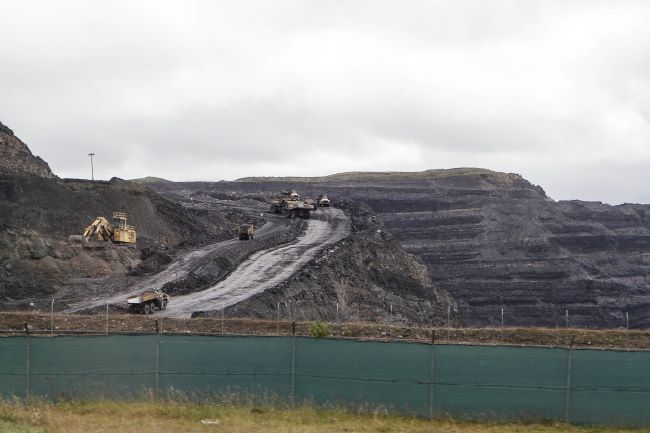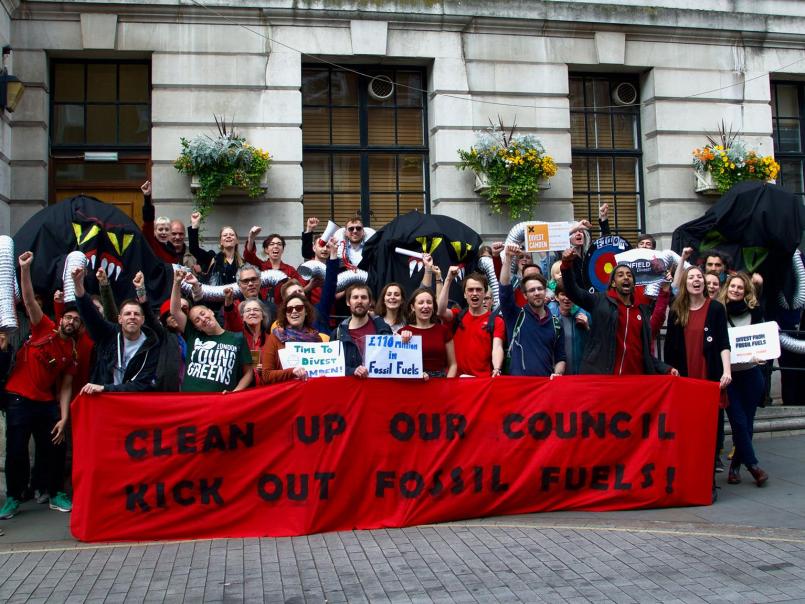How to decarbonise public sector pensions
Published: 11 Feb 2022
How old will you be in 2050?
Granted, a strange question to start an article about climate change.
I’ll be, er, I’d rather not say! But I’ll be hoping I won’t have to come out of retirement to congratulate most of the pension funds in Wales for finally having gotten rid of their last remaining fossil fuel stocks and shares!

Unfortunately, it's not a laughing matter, is it?! But at this point in time, that’s what we are actually talking about.
When we started the campaign in 2015 to get public sector pensions in Wales to get rid of their investments in fossil fuel companies little did we think that we’d still be sitting here in 2022 still talking about the same issue.
Because it’s common sense, surely? Fossil fuels cause climate change, investing money in fossil fuel companies gives them both the finance and the social licence to carry on their operations. Therefore, we take our money out of fossil fuels.
As Mark Carney warned us, when he was head of the Bank of England, these sorts of investments are a long-term risk, especially in a world that is taking ever more action on climate change. At some point fossil fuels will become largely redundant, so investments in them are at risk of basically becoming worthless.
The good
It’s not all been bad news here in Wales, however. Between 2017 and 2022 the 8 Welsh Local Authority Pension Funds (LAPFs) reduced their holding in fossil fuel companies by around half, from around £1bn to around £500million. They have also started shifting other bits of their pension pots into low carbon funds.
During that time too, the Welsh Senedd Members pension fund and Cardiff Council committed to divesting, and Swansea Pension Fund have committed to decarbonising by 2037.
Other councils such as Powys, Carmarthenshire, Ceredigion, and Monmouthshire made some sort of divestment decision, but their own pension funds haven’t then acted on this.
And therein lies the problem unfortunately.
There are many different players and they are all still looking at each other to take action.
The bad
Too many councils and councillors are unwilling to discuss or pass motions on divestment (some of the reasons councillors gave verge on the hilarious!), so pension fund committees are not getting any clear steer from the very organisations who pay into the funds.
Smaller organisations who pay into these funds such as town and community councils say they are too small to make much of a difference and therefore don’t add their voice to the call for change. As regulation over pension funds is not devolved, the Welsh Government claim they can’t do anything.
And then we have the Wales Pension Partnership (WPP) which brings together the 8 Welsh LAPFs. While they are making progress in moving away from fossil fuels, their voting and engagement advisors are now telling them that it’s actually better to keep hold of fossil fuel stocks because if they sell them other less scrupulous corporations and organisations might buy them up and therefore make action on climate change less likely! There are, of course, so many holes in that type of argument, not least, well if that’s the case then wouldn’t it be better to buy more fossil fuel stocks and shares thereby gaining more leverage over these companies?? I do hope that’s not where we are headed!
Interestingly though, when you go on to the advisor’s website you’ll see lists of hundreds of companies that they already exclude from their investments, many of which are on climate grounds as they somehow deem them to be ‘really bad for the climate’. So where does that leave the likes of ESSO, Shell, and BP? How are they not ‘really bad for the climate’? What on earth is the rationale in that thinking? So again, it’s another example of things making no sense whatsoever.

Solutions
- Good decisions
There are so many things that we will all need to do in the next 10 years if we are to avoid the worst effects of climate change, but this isn’t one of the most difficult. It just needs good decisions.
Pension funds need to hear from those paying into them that they want them to get rid of fossil fuel investments. So those are organisations such as town and community councils, colleges, leisure trusts and lots of public bodies you’ve heard of but would probably be shocked to hear that they have investments in fossil fuel companies. I won’t list them all here as that will take too long but the information is publicly available on the different LAPF websites.
We have written to them all and only a tiny percentage have committed to action. Bear in mind our only ask is that they contact their pension funds and simply ask them to put in place a realistic timeframe for getting rid of fossil fuel investments. That’s not the biggest ask in the world, is it?
We need local authorities to put forward motions on divestment, pass them by a simple vote and then for that message to get through to the pension funds. If they are in any doubt, simply just ask all the people who hold these pensions. Just ask them whether they want their money invested if fossil fuel firms or not. Even that simple step isn’t being done.
- Welsh Government
And this brings us nicely to the role of Welsh Government. There are a few things to point out here. First, they do still have a small amount of money themselves invested in the Rhondda Cynon Taf Pension Fund. They are therefore investing (albeit only a small percentage) in fossil fuels. There are also a variety of Welsh Government sponsored or arms-length bodies that also pay into different LAPFs.
Welsh Government don’t have regulatory powers over these pension funds but the question is - are we or are we not in a 'climate emergency'? Quite clearly the answer is yes. So let’s find a way around the problem of not having the regulatory powers. That only requires having the will to do it.
- Working together
Welsh Government and the public sector worked together to put in place a plan for the public sector in Wales to achieve a ‘net zero by 2030’ target. Rather unhelpfully though, when they and others were pulling these plans together, the decision was made not to include pensions in these plans.
If action isn’t taken on pensions, we could easily have a situation whereby local authorities achieve their own net zero targets by 2030 only for their pension funds to keep on investing in fossil fuel companies for a further 20 years (2050 being the target date for some of these pension funds).
Welsh Government will also soon be publishing a plan for achieving a net zero status as an organisation by 2030. This won’t be possible if they continue to pay into pension funds (however small the amounts or however indirectly) who in turn, invest in fossil fuels.
It’s imperative that Welsh Government and the public sector work together on this, to put in place plans to decarbonise their pensions by 2030 so mirroring the existing public sector targets. If they all worked together then the pension funds would need to act.
A win-win
There are also associated other ‘wins’ here too. Pension funds control a lot of money and are legally entitled to invest a certain percentage in infrastructure projects. Wouldn’t it be great if these infrastructure projects were here in Wales rather than in other parts of the world? These projects, spread around Wales, would help create jobs and stimulate local economies while at the same time giving a good rate of return for pension fund holders. A win-win all around!. That scenario is far more likely to happen if all parties are working together on a plan to ditch the fossil fuels and support local investments.
This needs leadership and it is entirely possible for Welsh Government to provide that.
We all know in our own lives that if we are presented with a problem and we can’t quite see immediately how to solve it, then we start thinking around the problem to come up with a solution. This is exactly what is needed here from Welsh Government and the public sector.
Imagine what sort of statement that would send out, Welsh Government and the public sector all worked together on this and came up with not only a plan to decarbonise their pensions by 2030 but then to also put in place a plan for infrastructure investments to be within Wales.

There is a massive win-win just sitting there waiting to be grabbed.
It just needs a few people to take action.
It would be a huge statement of intent on climate action here in Wales right when we need it.






